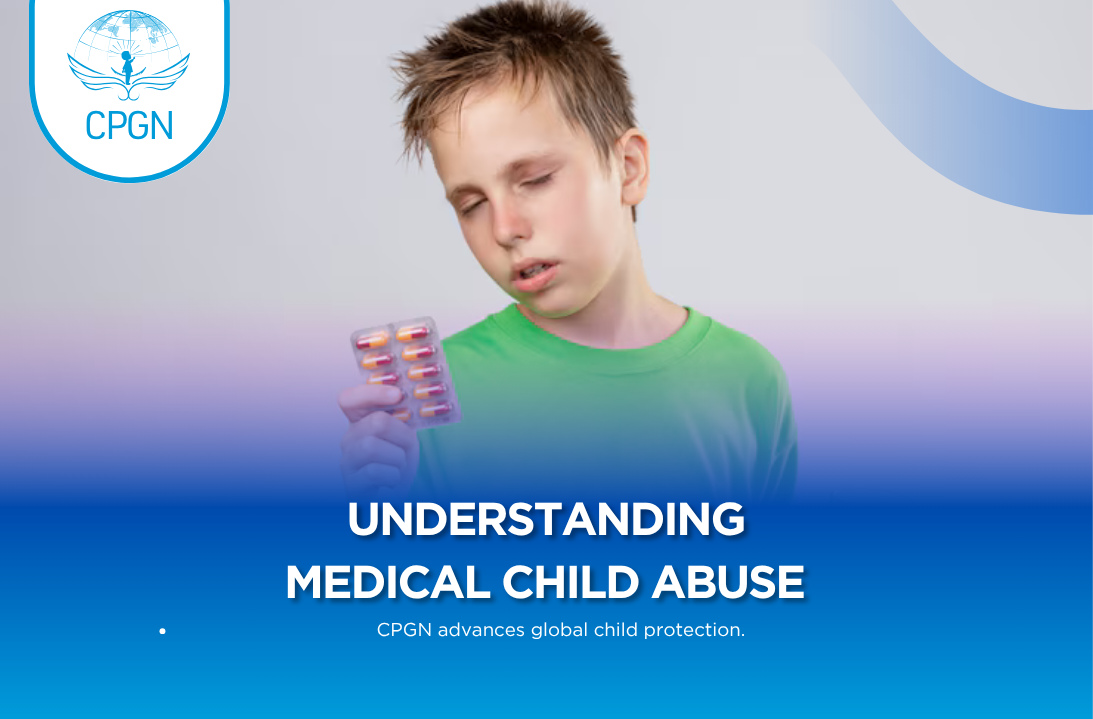Understanding Medical Child Abuse: Prevention, Effects & Treatment

Medical child abuse (MCA) is a rare but profoundly dangerous form of child maltreatment that affects an estimated 0.5 to 2.0 per 100,000 children globally. Studies show that 10% of cases result in a child’s death, and up to 50% of victims experience long-term medical conditions as a consequence. The abuse, often perpetrated by a caregiver, involves exaggerating, fabricating, or inducing symptoms of illness in a child to gain attention or sympathy. This blog will explore the causes, effects, and treatment of MCA, highlighting the critical role of organizations like CPGN, a nonprofit that handles FDIA/MSBP cases with care and precision, supporting affected children and strengthening the child welfare system to prevent further harm.
It’s also important to understand how this differs from medical child neglect, where a caregiver fails to provide necessary medical care. Both can lead to serious health problems, but for very different reasons.
What is Medical Abuse of a Child? Its Meaning and Definition
Medical child abuse, also referred to as Munchausen Syndrome by Proxy or Factitious Disorder Imposed on Another (FDIA), occurs when a caregiver exaggerates, fabricates, or induces physical or psychological symptoms in a child to gain attention or sympathy. This behavior forces children to undergo unnecessary medical treatments and procedures that can result in long-term health complications and, in severe cases, death. The main perpetrators are often parents or guardians who seek validation and emotional relief by involving the child in medical settings.
If you’re unfamiliar with child abuse in general, you can gain a better understanding of what constitutes child abuse by visiting our What is Child Abuse? blog.
Causes of Medical Child Abuse
While the exact causes of MCA remain elusive, several common factors appear to contribute to this disturbing behavior. Many perpetrators have a history of mental health issues, including personality disorders, trauma, and attachment difficulties. They may have unresolved emotional needs that are partially fulfilled by the attention they receive from medical professionals. Additionally, relationship dysfunction or family violence can sometimes exacerbate these behaviors. The root causes often include:
1. Psychological Needs of the Perpetrator
The caregiver’s need for attention and sympathy can drive them to fabricate or induce illness in the child
2. History of Trauma
Emotional abuse of a child often includes harsh verbal attacks such as constant criticism, yelling, name-calling, and humiliating language. These behaviors slowly erode a child’s self-esteem and sense of identity.
3. Attachment Issues
Caregivers with insecure attachment styles may be more likely to engage in MCA as a way to manipulate others into providing them with care or attention.
Effects of Medical Child Abuse
The effects of MCA on children are devastating. Not only do these children suffer from unnecessary medical procedures, but they also face long-term psychological trauma. Some of the key effects include:
1. Physical Damage
Repeated unnecessary medical interventions can lead to permanent physical disabilities or complications. These can include scarring, infections, organ damage, and even life-threatening conditions.
2. Psychological Trauma
Children affected by MCA may develop anxiety, depression, and a distorted sense of reality. They may struggle to trust others or to distinguish between what is real and what is fabricated by their caregiver.
3. Death
In some cases, the trauma caused by MCA can be fatal. It is estimated that up to 10% of children who are victims of MCA die as a result of the abuse.
4. Long-Term Health Issues
Even for children who survive, the medical abuse may leave lasting physical or mental health consequences. This can include chronic health problems or emotional issues that persist into adulthood.
To better understand the different types of physical child abuse, explore our Physical Child Abuse blog for an in-depth look at its signs and consequences.
Treatment of Medical Child Abuse
Treating medical child abuse is complex and requires a multidisciplinary approach. Once identified, immediate intervention is necessary to stop the abuse and protect the child. Treatment may include:
1. Psychological Intervention:
Both the child and the perpetrator need psychological support. The child may require therapy to process the trauma and rebuild their trust in medical professionals and caregivers. The perpetrator may require mental health treatment to address the underlying issues contributing to their abusive behavior.
2. Medical Care
Both the child and the perpetrator need psychological support. The child may require therapy to process the trauma and rebuild their trust in medical professionals and caregivers. The perpetrator may require mental health treatment to address the underlying issues contributing to their abusive behavior.
3. Child Protection Services
Social workers play a crucial role in investigating suspected cases of MCA, ensuring the child’s safety, and holding the perpetrator accountable. In some cases, the child may need to be removed from the home for their protection.
Additionally, emotional child abuse is often overlooked, yet it can be equally devastating. For more information on its impact and signs, check out our blog on Emotional Child Abuse.
CPGN's Role in Protecting Children from Abuse
The Child Protection and Global Network (CPGN) plays a crucial role in safeguarding children from abuse, including medical child abuse. CPGN works by:
- Raising Awareness: Through education and training, CPGN helps healthcare professionals, social workers, and educators recognize the signs of MCA and other forms of child abuse.
- Support and Advocacy: CPGN provides support to children who are victims of abuse, helping them access medical care, therapy, and a safe environment.
- Policy Development: CPGN works with lawmakers and advocacy groups to develop policies and programs aimed at preventing medical child abuse and ensuring that children who are affected receive the care and protection they need.
Help Us Break the Cycle of Abuse — Donate Today
Medical child abuse is a preventable tragedy, but it requires the collective effort of communities, healthcare providers, and child abuse prevention organizations like CPGN to ensure that children are safe from harm. By raising awareness, advocating for stronger protections, and supporting those who are most at risk, we can work together to break the cycle of abuse.
We encourage you to join us in our efforts to protect vulnerable children from this form of abuse. Every donation helps fund education, prevention programs, and direct support for children affected by MCA.
Please donate today and help us make a difference in the lives of children at risk.
Mark Schwartz
See a child in danger? If you are in immediate danger, call local emergency services. For guidance from CPGN, Get Help.
CPGN is a 501(c)(3) — donations are tax-deductible where applicable. Our goal is to ensure the safety and protection of every child until it is achieved.
Quick Links
See a child in danger? If you are in immediate danger, call local emergency services. For guidance from CPGN, Get Help.
CPGN is a 501(c)(3) — donations are tax-deductible where applicable. Our goal is to ensure the safety and protection of every child until it is achieved.
Copyright © 2025 CPGN. All rights reserved by Majnate LLP | Privacy Policy | Terms and Conditions

